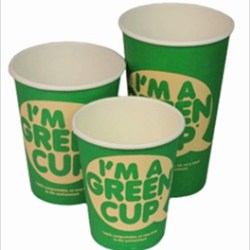If this is your company, CONTACT US to activate Packbase™ software to build your portal.


It has recently been reported that 2.5 billion takeaway coffee cups per year are thrown away in the UK, and you may be surprised to hear that less than 1% get recycled. This is because most cups have a polyethylene coating (needed to stop leaks) that must be separated before recycling.
The Facts
- About 2.5billion takeaway coffee cups are thrown away a year in the UK.
- Less than 1% of takeaway cups get recycled.
- Most cups have a polyethylene coating (needed to stop leaks) that must be separated before recycling.
Biopac’s response:
Comments by Mark Brigden, Technical Director at Biopac UK Ltd.
Biopac is the leading UK developer and supplier of environmentally responsible packaging. Biopac coffee cups are produced from certified sustainable board and unlike a conventional coffee cup (lined with a plastic film), Biopac’s cups are lined with a plant starch material to make the cup leakproof. Using a starch film, means that the cups are fully compostable and can be disposed of, along with food waste, via ‘In-Vessel’ composting. Biopac also produce a compostable alternative to the plastic lid which is also made from a plant starch material and is fully compostable. This material contains significantly less (over 50%) embodied carbon than plastic.
All Biopac’s compostable products will completely break down in less than 12 weeks, leaving no harmful residues, so very kind to the environment.
Most plastics are derived from Petro chemicals – a finite resource. Using compostable products made from renewable materials has significant environmental benefits. Composting is a great opportunity to divert waste that would otherwise be landfilled — and by composting, you create valuable humus which can benefit future crops.
The British public are increasingly expressing that they want to patronise businesses that use good sustainable practices. Using environmentally friendly packaging shows customers their concerns are shared, and trust and loyalty can be built.
One thing traders will want to watch out for as they start to investigate alternatives for their packaging needs is products being sold on the market that claim to be eco-friendly but won’t meet the requirements. In reality, these products may be just conventional plastic with an additive that merely breaks the material into fragments. These fragments still take 200 years to disappear. The best way to be certain is to ask your supplier for the relevant certifications.” Biopac cups are certified to European standards for compostability – EN13432.
In March 2012, Biopac launched ‘I’m a green cup’ (pictured) which is 100% compostable, and has 'I'm a green cup' printed in clear bold graphics, helping coffee shops to be more responsible and demonstrate their commitment to the environment. The 'I'm a green cup' proved so popular with our customers, in September 2012 we launched an insulated version which has two layers of board giving excellent thermal protection and removing the need for an additional clutch or sleeve. The cups are very popular with coffee shops, outdoor catering facilities and the end user.
The issue with recycling doesn’t just stop with cups. Biopac exhibited at the Northern Restaurant and Bar show in Manchester this week and a fact a number of visitors were surprised at is related to takeaway pizza boxes. Pizza boxes are made from corrugated cardboard, however the cardboard becomes soiled with grease, cheese, and other foods once the pizza has been placed in the box. Once soiled, the cardboard cannot be recycled because the paper fibres will not be able to be separated from the oils during the pulping process. Food is a major source of contamination in various paper categories. Composting offers a viable alternative disposal route.
Biopac’s mission is to establish high performance alternatives to oil based and unsustainable materials by researching and developing new materials, finding renewable feedstocks and using novel technologies. To facilitate this, we have a sister company – Biopac Technology – which has a very active research programme supported by European funding (www.biopac-technology.com).







